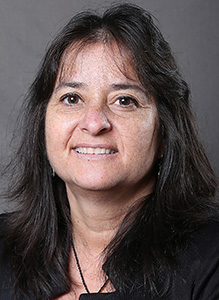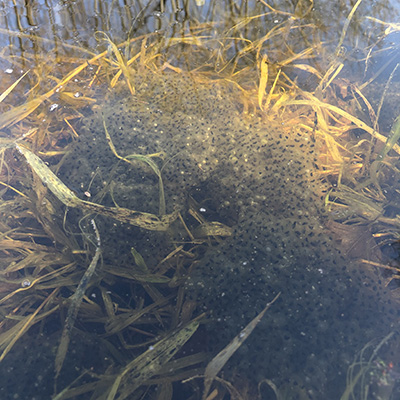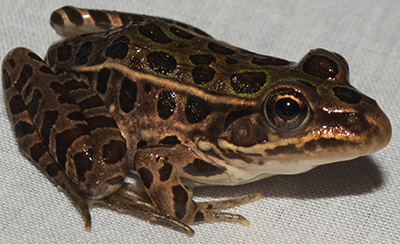Sepulveda Receives AgSeed Grant for Northern Leopard Frog Research
Dr. Marisol Sepulveda has received a Purdue Ag Seed grant for her project "Establishing Northern leopard frogs as a model for toxicology and the global research community through reference genome assembly and annotation."
Sepulveda, the project leader, will be collaborating with FNR postdoctoral researcher Tyler Hoskins, postdoc Amanda Pendleton from the Wisecaver lab in the department of biochemistry and Dr. Jason Cannon, associate professor of toxicology in the school of Health Sciences.
postdoc Amanda Pendleton from the Wisecaver lab in the department of biochemistry and Dr. Jason Cannon, associate professor of toxicology in the school of Health Sciences.
The Northern leopard frog is a common species used in the study of endocrine disruption, cancer and drug discovery, conservation biology and ecotoxicology, but currently no reference genome exists for the species, which limits its ability to be used in multiple disciplines. At Purdue, Sepulveda and others are utilizing the Northern leopard frog to study how animals respond to contaminants, diseases and other environmental stressors, specifically in regards to neurological disease, but the lack of a reference genome for this species severely hinders their research in identifying underlying genetic and molecular targets of toxicity and disease.
This AgSeed project research aims to generate a high-quality draft genome assembly of the Northern leopard frog, Rana pipiens, using long and short-read sequencing technologies and a comprehensive gene call set using already sequenced transcriptomic resources. This research will not only fill the need for more diversity of amphibian genomes among this large and diverse group of organisms of which only 15 frog reference genomes are publicly available, but also will solidify this species as a model for historical, current and future investigations, impacting research efforts far beyond Purdue.
"Having a genome for a triploid New World frog would benefit many fields, ranging from developmental biology to drug discovery and ecology," Sepulveda said.
Unlike other model amphibians, R. pipiens is widely distributed across the country; produces large, easily collectible egg masses; transitions from larva to terrestrial sub adult in 60 to 80 days; and is easily reared as both larvae and adults in captivity. Due to these factors, Northern leopard frogs could provide an exceptional model organism with a genome reference available.
as both larvae and adults in captivity. Due to these factors, Northern leopard frogs could provide an exceptional model organism with a genome reference available.
Globally, a genome could be invaluable in drug discovery as well as with research surrounding human embryonic/fetal development exposures to neuro-endocrine disrupting chemicals, due to the similarity to the embryonic and larval stages of the frog.
At Purdue, a genome would allow researchers to expand their current work on per-/poly-fluorinated alkyl substances,
or forever  chemicals, which are found in sources such as fire-fighting foams, food packaging, non-stick materials, make-up, grease/stain repellent textiles, etc., and their effects on neurodegenerative diseases. Northern leopard frogs produce human-like neuromelanin, a pigment in the brain that modulates neurodegenerative diseases like Parkinson's, which is not found in traditional research models such as mice, flies or rats.
chemicals, which are found in sources such as fire-fighting foams, food packaging, non-stick materials, make-up, grease/stain repellent textiles, etc., and their effects on neurodegenerative diseases. Northern leopard frogs produce human-like neuromelanin, a pigment in the brain that modulates neurodegenerative diseases like Parkinson's, which is not found in traditional research models such as mice, flies or rats.
When the leopard frogs emerge in early spring , Sepulveda and her collaborators will begin by collecting some specimens for DNA sequencing. They will then utilize PacBio long-read sequencing and Illumine short-read sequencing provided by Novogene to generate contiguous DNA assemblies as well as predicted gene models for the Northern leopard frog, which in turn can be used by researchers around the world.
This project fits under the Purdue College of Agriculture's strategic initiative of using molecular approaches to expand the frontiers of agriculture and life sciences and strengthening ecological and environmental integrity in agricultural landscapes.
Sepulveda received the Purdue Agricultural Research Award in 2018, for her work in the area of ecotoxicology and aquatic animal health. The award marks the highest honor recognizing research excellence by a faculty member in the College of Agriculture. Sepulveda came to Purdue in 2004 as an assistant professor, was promoted to associate professor in 2009 and full professor in 2014. She was named as Purdue Forestry and Natural Resources' associate department head for research in 2018.
In addition to her involvement in this AgSeed research grant, Sepulveda also is part of a Strategic Environmental Research and Development Program project on the "Development of PFAS-free fire extinguishing foam" with FNR colleague Dr. Jason Hoverman, as well as Jeffrey Youngblood and Carlos Martinez in materials engineering.
She recently completed a project with the National Academy of Sciences on "Endocrine Disrupting Chemicals in Kabul and Swat Rivers, Pakistan, and Their Impact to Fish Populations and Rural Community Livelihoods).






